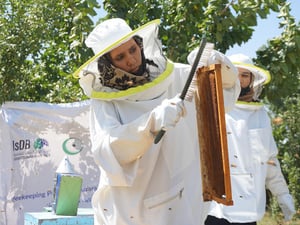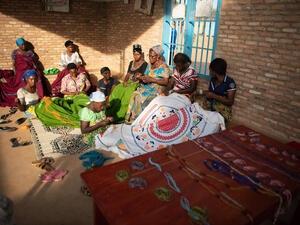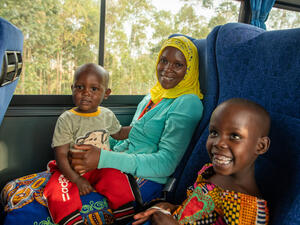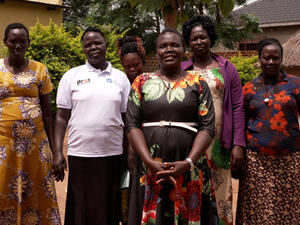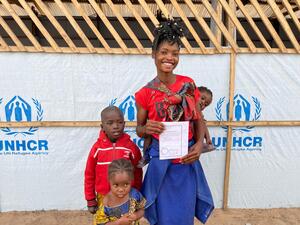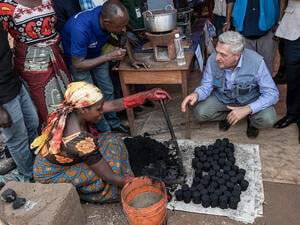Lebanese rush to return home in wake of ceasefire
Lebanese rush to return home in wake of ceasefire

A Lebanese Bedouin woman and her family rejoice as they prepare to cross the Syrian-Lebanese border just hours after a ceasefire came into force.
YABOUS BORDER CROSSING, Syria, August 14 (UNHCR) - Thousands of Lebanese cars packed with families and belongings jammed the roads on Monday as those who had fled war in their country over the past month rushed to return to what remains of their homes.
"We've been here for 26 days, it's time to go home," a father of seven said during a quick stop at the UN refugee agency tent at this crossing, where staff distributed packages of bottled water and high-energy biscuits.
He and his family had stayed in a hotel thrown open to Lebanese for free in the Zabadany area near the Syrian capital, Damascus. Now they wanted to go back to southern Beirut following the announcement of a ceasefire.
The man said he did not know where his family would sleep tonight: "But we don't care. Maybe our house is destroyed, maybe it is still there. We don't know. But even if we have to sleep on a park bench tonight, we are so happy to go home."
Syrian taxis, Lebanese taxis, minibuses, private vehicles, trucks and even tractors packed with people were lined up at the immigration checkpoint at Yabous crossing, the main route between Damascus and Beirut. Conditions were repeated at other crossings from Syria into Lebanon monitored by UNHCR staff. By four in the afternoon, eight hours after the ceasefire took effect, UNHCR estimated 10,000 Lebanese had returned from Syria.
The number of Lebanese sheltering in Syria had peaked at 180,000 - out of nearly a million Lebanese displaced by the war.
Inside Lebanon, the roads back to areas depopulated by the war were the same. UNHCR had five mobile teams monitoring the main transit routes in the country, both from Syria and southward into the areas hardest hit by the fighting. One UNHCR staff member counted 1,200 cars per hour heading in the direction of Marjayoun, a regional centre near the Israeli border.
Similar scenes were found on the road heading south from Sidon to Tyre, which had been totally cut off in the past week by the destruction of the last bridge on the coast road. The congestion meant a UN convoy, which included shipments of UNHCR relief items, took more than five hours to cover the distance normally driven in 45 minutes.
The five UNHCR teams handed out water, blankets, mattresses and other necessary items to the Lebanese returning home. They also issued warnings about the large amount of unexploded munitions scattered across the landscape.
In Syria, UNHCR said in addition to distributing assistance to those returning, identifying vulnerable individuals in need of special help and monitoring the border crossings, the organisation would provide transportation assistance to those Lebanese who cannot afford it themselves.
"It's amazing to see that so many people have decided to return immediately," said Laurens Jolles, UNHCR representative in Syria. "These are people who come from all over Lebanon and the numbers seem to pick up.
"On the other hand I'm also a bit concerned about what actually might wait for them in their villages of origin, in what state they might mind their houses, their friends or relatives. But I think their speedy return is a hopeful development."
In Beirut, UNHCR Assistant High Commissioner Judy Cheng-Hopkins met with Lebanese Prime Minister Fouad Siniora to discuss planning for the return and rehabilitation of the displaced population. UNHCR plans to initially offer tents to the most vulnerable victims of the conflict but to then work with other agencies and the government to provide more solid shelter.
The ceasefire cleared the way for an acceleration in the amount of aid arriving. The United Nations was unloading two ships in Beirut harbour that contained UNHCR mattresses, tents and blankets that had been flown to Cyprus last week from Jordan and Denmark. In Sidon, UNHCR opened a warehouse on Monday to locate assistance nearer to the areas of greatest need. A shared office with other UN organisations will also be opened in Tyre, the battered coastal city just north of the Israeli border.
There was some unease with the speed of the return immediately after the start of an untested ceasefire. One girl, telling a UNHCR monitor that she just wanted to get back to her toys and friends, said her family had packed and left Syria two hours before the official start of the ceasefire.
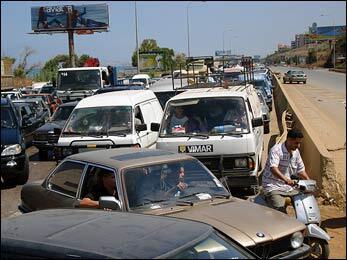
Lebanese determined to get home as quickly as possible get caught up in a traffic jam.
A Syrian Immigration official said as Lebanese cars poured over the border, blaring horns and flying flags: "Let's just hope that they don't need to come back and that peace will last."
But the returnees, anxious just to see their homes again, were untroubled either by security concerns or the uncertainty about what they might find in their war-ravaged cities, towns and villages. "It doesn't matter if our homes are destroyed, we will build them again," was a common refrain heard by UNHCR staff.
By Annette Rehrl at Yabous Border Crossing
and Astrid van Genderen Stort in Beirut

